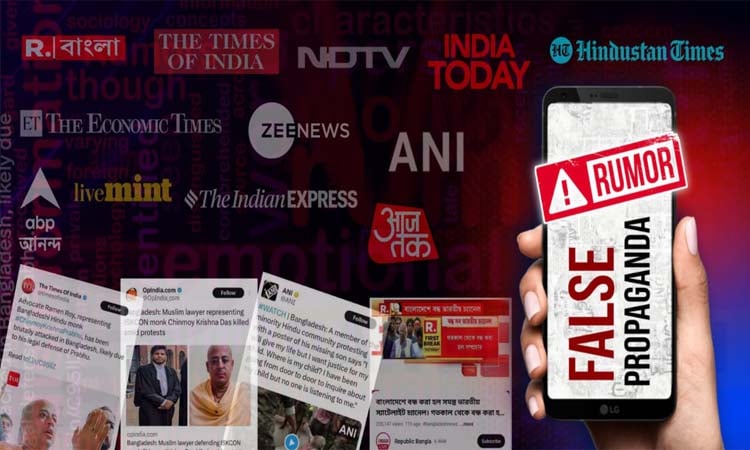News Flash
News Flash

DHAKA, Feb 03, 2025 (BSS) - Rumor Scanner, a fact-checking body, detected 271 misinformation cases to be circulated online in January as it also published two statistical reports and a fact file during this period.
According to data compiled from fact-check reports on Rumor Scanner's website, politics was the most affected category, with 114 cases, making up 42 percent of all misinformation detected. This was followed by 67 cases on national issues, 29 on international affairs, 18 on religion, 15 on entertainment and literature, 9 on education, 6 on fraud, and 5 on sports.
Among the identified misinformation cases, 115 were information-based, making it the most frequently observed category. Additionally, 54 cases were image-based, while 102 were video-based. In terms of classification, 175 cases were entirely false, 65 were categorized as misleading, and 31 were identified as altered.
Facebook remained the primary platform for misinformation, with 225 cases detected in January. This was followed by 56 cases on X (formerly Twitter), 44 on TikTok, 42 on YouTube, 19 on Instagram, and at least one on Threads. Misinformation was also found in mainstream media. According to Rumor Scanner, at least 16 instances of misinformation were published by multiple news outlets in Bangladesh.
Since last year, misinformation related to Bangladesh has been increasingly circulated by Indian media outlets and social media accounts based on India. This trend continued in January, as observed by Rumor Scanner. Last month, seven instances of misinformation involving Bangladesh were identified in Indian media.
Additionally, nine cases were traced back to Indian social media accounts and pages spreading false information about Bangladesh. The spread of communal misinformation has been a topic of concern for the past few months. In January alone, 32 instances of communal misinformation were detected. Among them, 25 cases were linked to Indian social media accounts and pages spreading false information about Bangladesh. The spread of communal misinformation has been a topic of concern for the past few months. In January alone, 32 instances of communal misinformation were detected. Among them, 25 cases were linked to Indian social media accounts and pages that propagated false or misleading narratives.
According to Rumor Scanner's observations, 13 instances of misinformation related to the current interim government were circulated in January. The findings revealed that 77 percent of these false claims had the potential to harm the government.
Similarly, 12 instances of misinformation were identified in January concerning Dr. Muhammad Yunus, the government's chief advisor.
Among government advisors, three instances of misinformation were identified involving Dr. Asif Nazrul, all of which were negative. Two cases were found related to Jahangir Alam Chowdhury, with 50 percent being negative.
According to an analysis of fact-checks conducted last month, Rumor Scanner found that among political parties, Bangladesh Jamaat-e-Islami was the most frequently targeted by misinformation, with 16 instances identified. Among these, 94 percent were found to create a negative perception of the party. Additionally, 10 instances of misinformation were linked to Bangladesh Islami Chhatra Shibir, Jamaat's student wing, all of which were negative. Jamaat Ameer Dr. Shafiqur Rahman was also the subject of two misinformation cases, both of which were against him.
Meanwhile, Bangladesh Awami League, which was ousted from power in August last year, was linked to six instances of misinformation in January, all of which had the potential to create a positive perception of the party.
During the same period, 20 misinformation cases were identified concerning Awami League President Sheikh Hasina. Rumor Scanner found that 85 percent of these false claims worked in her favor.
Among Awami League's affiliated organizations, Bangladesh Awami Jubo League was associated with three misinformation cases, 67 percent of which were negative. Bangladesh Students League was linked to four misinformation cases, all of which worked in its favor.
Four misinformation cases were linked to the Bangladesh Police, one of which involved Dhaka Metropolitan Police (DMP) Commissioner Sheikh Md. Sajjat Ali. In January, two instances of misinformation were also identified concerning the Border Guard Bangladesh (BGB).
The 'Boishomyobirodhi Chatro Andolon' (Anti-discrimination Student Movement), which played a leading role from the quota reform protests to the fall of the government, has been a frequent target of misinformation in recent months. This trend continued in January, with seven instances of false information identified concerning the organization.
Additionally, 18 misinformation cases were detected targeting its leaders. Among them, five were linked to Hasnat Abdullah, seven to Sarjis Alam, two each to Khan Talat Mahmud Rafy and Nusrat Tabassum, and one each to Hasib Al-Islam and Tilottoma Iti.
Analyzing last month's fact-checks, Rumor Scanner observed that previously debunked misinformation is resurfacing. One contributing factor appears to be Facebook's 'Memories' feature, which resurfaces past posts from the same date in earlier years.
It was observed that misinformation originally spread in previous Januaries was being reshared at the same time this year, despite having been fact-checked before. Rumor Scanner identified 14 such cases in January where previously debunked misinformation was circulated again. Additionally, 10 death hoaxes were spread last month, targeting notable individuals and incidents across different sectors.
At the beginning of January, a devastating wildfire in Los Angeles, USA, triggered at least 10 misinformation cases on both social media and news platforms. This was the single most misinformation-heavy event of the month. Another five cases of misinformation were linked to the January 26 clashes between students of the seven affiliated colleges of Dhaka University and Dhaka University students.
Misinformation was also spread by misusing the names and logos of major news outlets. In January, Rumor Scanner detected 39 instances of misinformation using fake news cards, headlines, and logos of 20 local and international media outlets. Among them, Jamuna TV was misused the most, appearing in seven false claims, followed by Amar Desh, which was used in five cases. Indian media outlet Hindustan Times was also falsely associated with at least one instance of misinformation.